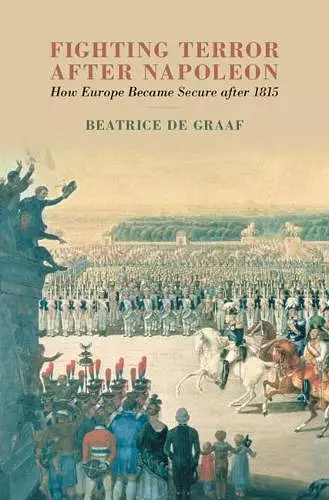Fighting Terror after Napoleon
How Europe Became Secure after 1815
Format:Hardback
Publisher:Cambridge University Press
Published:1st Oct '20
Currently unavailable, and unfortunately no date known when it will be back
This hardback is available in another edition too:
- Paperback£29.99(9781108816205)

Europe was forged out of the ashes of the Napoleonic Wars by means of a collective fight against revolutionary terror.
After twenty-six years of unprecedented revolutionary upheavals and endless fighting, the victorious powers craved stability after Napoleon's defeat in 1815. With the threat of war and revolutionary terror still looming large, the coalition launched an unprecedented experiment to re-establish European security. With over one million troops remaining in France, they established the Allied Council to mitigate the threat of war and terror and to design and consolidate a system of deterrence. The Council transformed the norm of interstate relations into the first, modern system of collective security in Europe. Drawing on the records of the Council and the correspondence of key figures such as Metternich, Castlereagh, Wellington and Alexander I, Beatrice de Graaf tells the story of Europe's transition from concluding a war to consolidating a new order. She reveals how, long before commercial interest and economic considerations on scale and productivity dictated and inspired the project of European integration, the common denominator behind this first impulse for a unification of Europe in norms and institutions was the collective fight against terror.
'Beatrice de Graaf provides a deep and brilliantly original history of the idea of Europe, not as an imagined essence, but as a dynamic co-operative platform, a trans-national way of legitimating authority and action. Compellingly argued, elegantly written and rich in arresting episodes, Fighting Terror after Napoleon is a stimulating and provocative re-reading of early nineteenth-century Europe.' Sir Christopher Clark, author of The Sleepwalkers: How Europe Went to War in 1914
'International history at its best. Analysing the Vienna system after 1815 as a security culture, the book not only unfolds a stimulating new view on post-Napoleonic Europe, but also demonstrates the enormous potential of historical security research.' Eckart Conze, co-editor of Nuclear Threats, Nuclear Fear, and the Cold War of the 1980s
'A celebrity scholar of terrorism in the Netherlands, the indomitable Beatrice de Graaf now delivers us a new history of terror and security. Fighting Terror after Napoleon makes the nineteenth century matter again, as a way of understanding our present, not only the international order we are on the verge of losing, but its wildest realistic ambitions.' Glenda Sluga, author of Internationalism in the Age of Nationalism
'An absorbing and insightful account of the Allied occupation of France after Waterloo that shows how its mechanisms served as the keystone for the broader efforts to maintain peace and security after the French Revolution and Napoleon, across Europe and beyond.' Brian Vick, author of The Congress of Vienna: Power and Politics after Napoleon
'This analytically sharp, deeply historical work makes clear just how entangled and enfolded our disciplines are becoming, conceptually and empirically. As such, de Graaf's book potentially marks a step change in the quality and depth of conversation between the disciplines. It is thus a remarkable achievement, not only of history but of inter-disciplinarity.' Jennifer Mitzen, H-Diplo
'Impressively researched, carefully conceptualized, and creatively narrated, de Graaf 's study reminds us of how our modern understanding of and approach to 'security,' both military and political, is a product of the post-Napoleonic age.' Christine Haynes, Journal of Military History
'In Fighting Terror after Napoleon, de Graaf (Utrecht Univ., the Netherlands) analyzes how the UK, Russia, Austria, and Prussia cooperated through the Allied Council of the Quadruple Alliance to create a European-wide system of security to maintain peace and fight against terror after Napoleon's final defeat. Her detailed and lively account, which is based on extensive use of archival sources from across Europe, will stimulate scholarly debates regarding the characteristics of the post-Napoleonic settlement as well as the nature of 19th-century diplomacy.' M. E. Ailes, Choice
'Beatrice de Graafs book Fighting Terror after Napoleon makes an important contribution … There is so much to praise in de Graaf's approach to expanding our understandingof European security practices after 1815.' Maartje Abbenhuis, Journal of Modern History
ISBN: 9781108842068
Dimensions: 235mm x 158mm x 29mm
Weight: 960g
518 pages